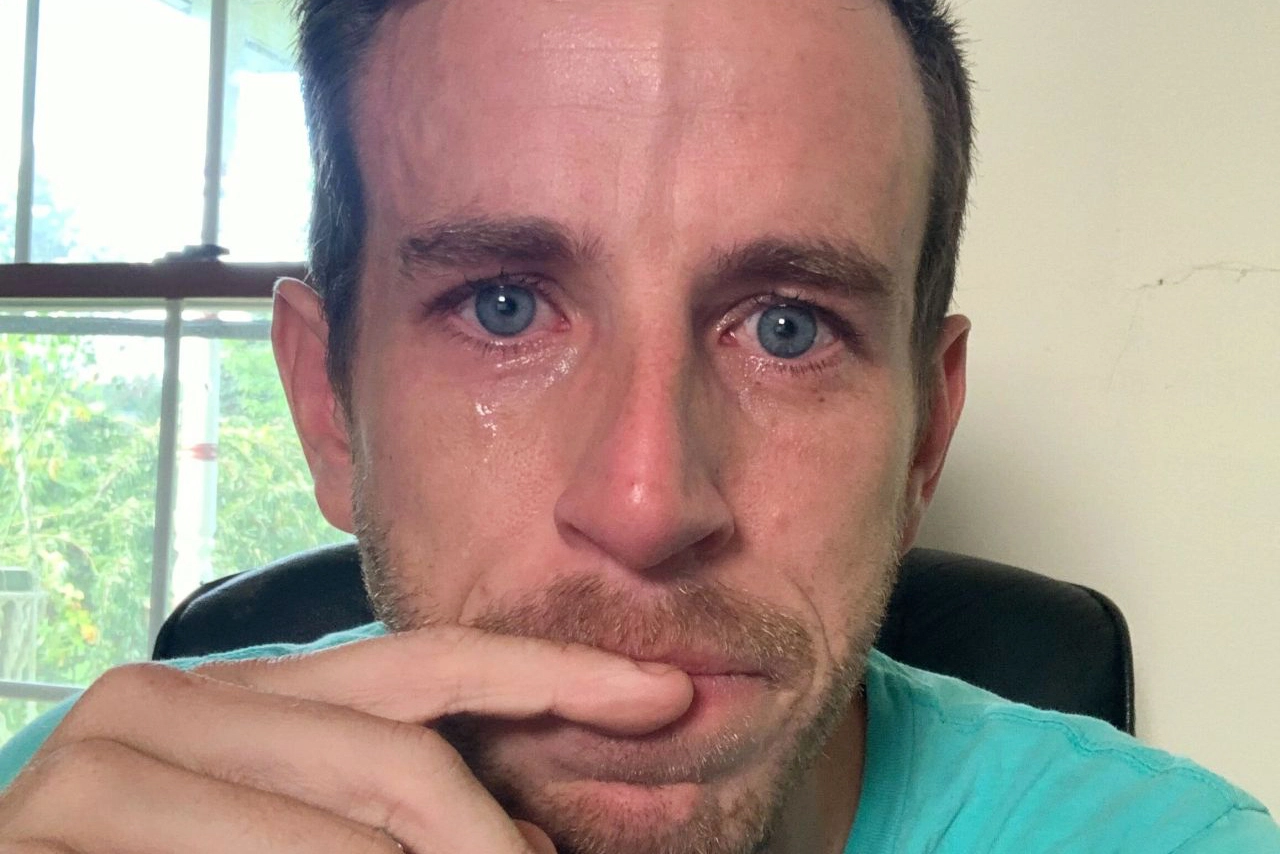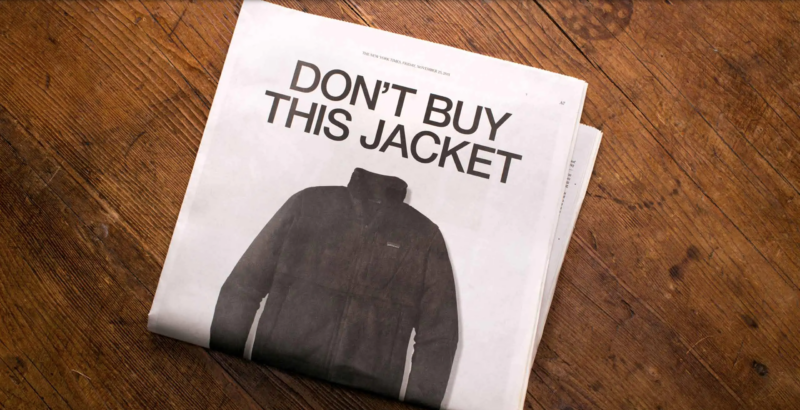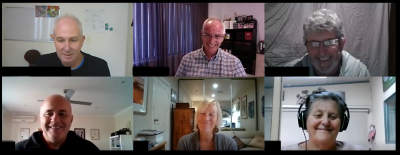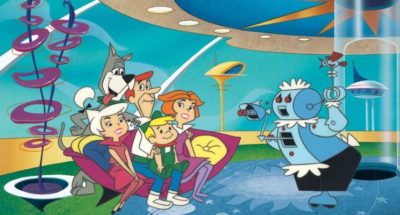The changing face of LinkedIn and online professionalism
You may have noticed an increase in posts of a personal nature (and the responding battle cry of ‘this isn’t Facebook!’) on LinkedIn recently, with users of the app stretching and changing definitions around what constitutes professionalism in the public sphere.
As the oldest of the major social networks still in use today, LinkedIn has been undergoing a subtle transformation in how users engage with the platform – as workspaces and roles shift and evolve since the advent of COVID in 2020.
As of 2022 LinkedIn has 810 million members, with almost 60% of those users between the ages of 25 and 34 years old.
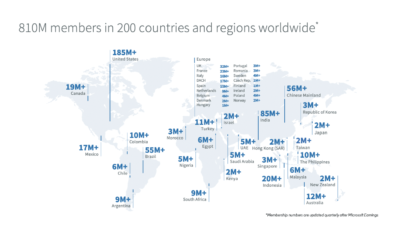
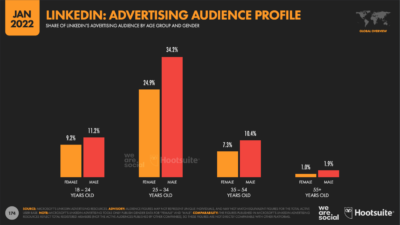
In 2016 Microsoft announced that they would aquire LinkedIn for $26.2 billion in an all cash deal – with the hope of turning the job seeking site into more of a social newtorking site.
It makes sense that as the platform moved to mirror its competitors, and millienials took over as the largest adopters – that the content would change.
Jessica Sier, Technology Journalist at The Financial Review, argues that posting personal content on social media sites is kind of the point.
“I think that’s what it’s designed for. I don’t have any problem with people sharing political views or any personal news. I do have a problem with the deliberate spread of misinformation on social media platforms, but I do think the calibre of LinkedIn users mean low quality information is probably weeded out pretty quickly.”
The app isn’t without controversy however. Brand advisor and creative director Arielle Egozi recently went viral after adding sex work to their LinkedIn profile, along with the message, “they don’t have to understand it, but they better respect the hell out of it.”
In their first post, Arielle outlines that their experience as a sex worker has equipped them with the skills and boundaries that make them particularly potent in their other professional roles. The post has garnered over 10,000 reactions and 1,600+ comments – which ranged from supportive to aggressive, as commentators debated whether this sort of content ‘has a place on LinkedIn.’
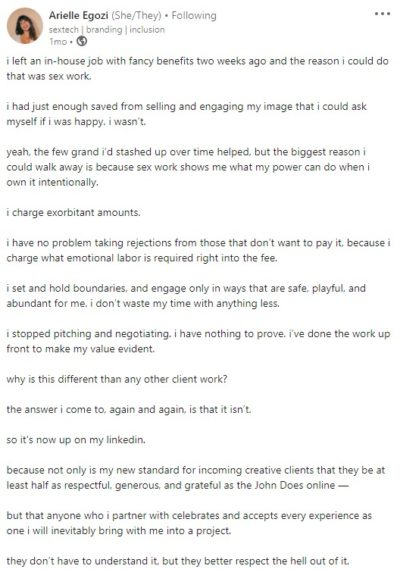
One commenter posted, “I am an early user of LinkedIn. One of the first 500 people to post a job. I have watched the trend of over-sharing and posting highly personal matter and NEVER commented. This my friends, has crossed the line. This is not what LinkedIn is intended for. It is way too much information and belongs on different site. Unless, you are in certain parts of Nevada, it isn’t even legal in the U.S. You don’t need to put every job on your profile … some jobs will not boost your career.”
Another countered, “As with all social media channels, LinkedIn allows its users to build communities. Arielle wants to build a community of “respectful” clients who “celebrate and accept all experiences” hence sharing this part of her career. So, before I see another comment saying “LinkedIn wasn’t the place for this” ask yourself: Is LinkedIn not the place to build a community by sharing your personal experiences within your career journey? OR Do I just feel uncomfortable because I wasn’t expecting the topic of sex work to come up on my timeline? If it’s the second one, that’s fine! You don’t meet Arielle’s criteria for people who celebrate and accept all experiences, so her page isn’t the community for you. But for goodness sake, stop telling her she’s using the platform wrong because as a social media manager I can tell you for a fact she is achieving her goal with this post. LinkedIn is for ALL professionals, not just the professions that meet your cultural / religious beliefs and align with your personal opinions.”
In a follow up post, Arielle referenced the overwhelming reaction to their post – while also calling into question the weaponization of ‘professionalism’ against them.
They wrote, “It’s wild to witness folks blatantly secrete their misogyny, respectability politics, and hatred for swers (sex workers) on a “professional” platform — but then i remember who invented the concept of “professionalism” in the first place.”
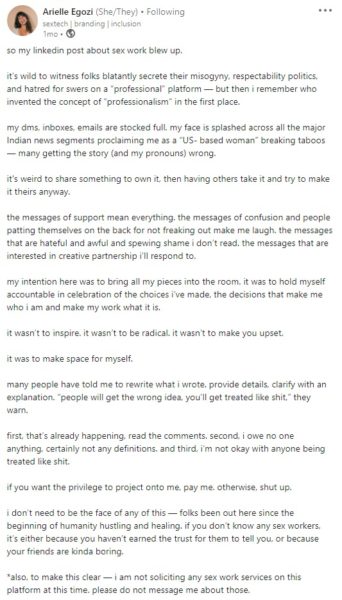
It’s likely that what they are referencing here is the notion that professionalism is a racist construct used to uphold ideals of white supremacy.
In an online seminar posted in February 2022 entitled ‘Is Professionalism a Racist Construct?’, administrators from the Brown School at Washington University in St. Louis argued that the term ‘professionalism’ is actually coded language for reinforcing white favouritism in the workplace.
In an online forum, the University posits that, “The term professionalism has at times been used to silence and marginalize people of colour, when attributes of appearance, language or interactions that have nothing to do with job knowledge or constructive collegial relationships are labelled as ‘unprofessional.’”
Michael Beveridge, freelance content creator and Head of Creative and Brand at Hnry and CarClarity, regularly uses LinkedIn to connect with prospective clients and engaging with friends and colleagues.
He believes that ideas around ‘professionalism’ are evolving, for the better.
“I think the façade of corporate professionalism is finally, thankfully, fading away and authenticity is becoming something people feel comfortable with sharing. It’s all packaged up with the slow fade of our parents’ values, which is excellent because they didn’t let gay people get married so why would I listen to them on what appropriate work attire is?” says Beveridge.
A LinkedIn user that recently fell foul of the authenticity push on the social media platform is ‘crying CEO’ Braden Wallake. The 32-year-old chief executive of HyperSocial found himself at the center of the LinkedIn community’s ire after posting a tear stained reflection of his first experience of laying off staff.
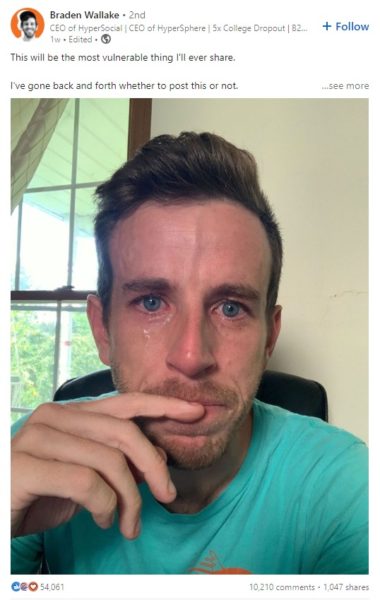
In the text accompanying the offending image, Wallake lamented, “This will be the most vulnerable thing I’ll ever share… Days like today, I wish I was a business owner that was only money driven and didn’t care about who he hurt along the way. But I’m not. So, I just want people to see, that not every CEO out there is cold-hearted and doesn’t care when he/she have to lay people off.”
Whatever his intended purpose in posting the message was, the overwhelming response was one of derision and suspicion.
One commenter summed up the general consensus, posting “This does come across as tone-deaf, self-indulgent and a tad inauthentic. Maybe you could have made the post about the people your decisions have impacted, rather than about yourself?”
Guardian columnist, Arwa Mahdawi delivered her own succinct and scathing take down, writing, “Wallake’s performative empathy is a perfect encapsulation of everything that is irritating about LinkedIn and, by extension, everything that is wrong with corporate culture.”
She added, “LinkedIn used to be a handy but unexciting online Rolodex. In recent years, however, it has become a cesspit of toxic positivity and a temple to cringe.”
Mahdawi also pointed out that there is even a subreddit called LinkedInLunatics created to catalogue “insufferable LinkedIn content”.
So how do you avoid becoming the next feature on LinkedInLuncatics? According to Michael Beveridge it’s all about creating authentic content.
“At its core, any social platform, LinkedIn included, is a group of people looking for content. It’s just some coding covering a group of 100 million people all looking to gain value (new job, career tips, gossip, learnings etc) in their lives. Same as an audience at a standup show. Or at a football game, a TED talk, a dinner party,” says Beveridge.
“Personality, warmth, humour will ALWAYS win. Always.”
